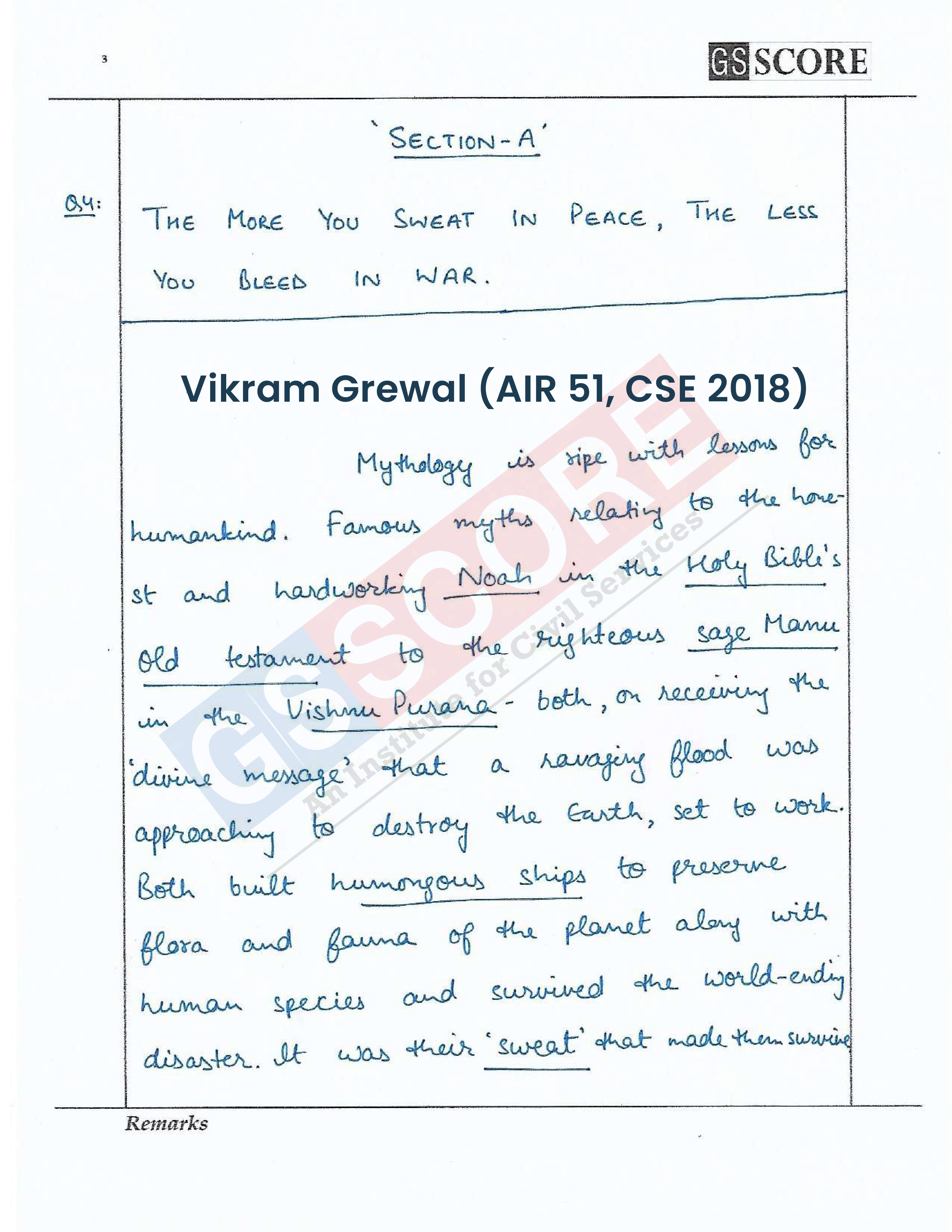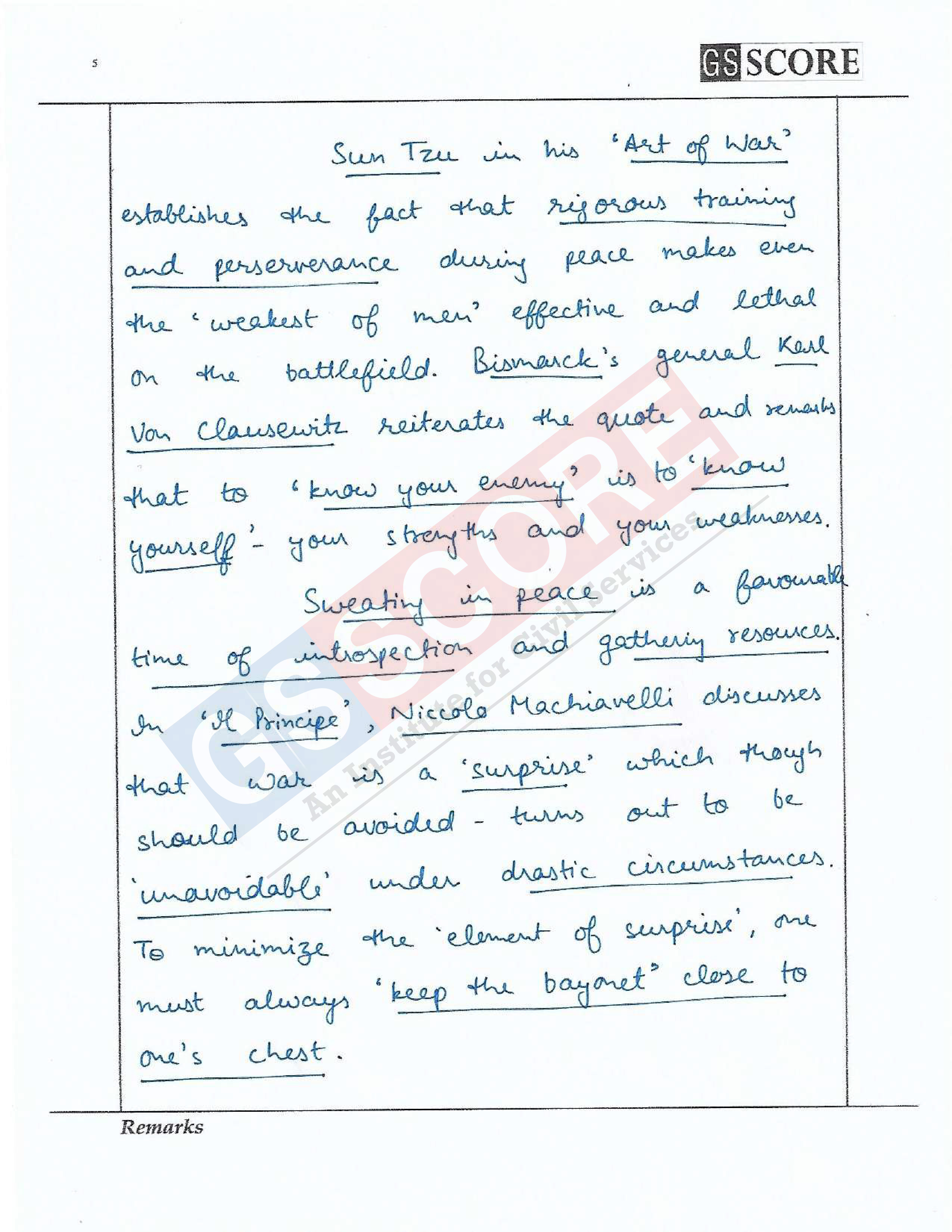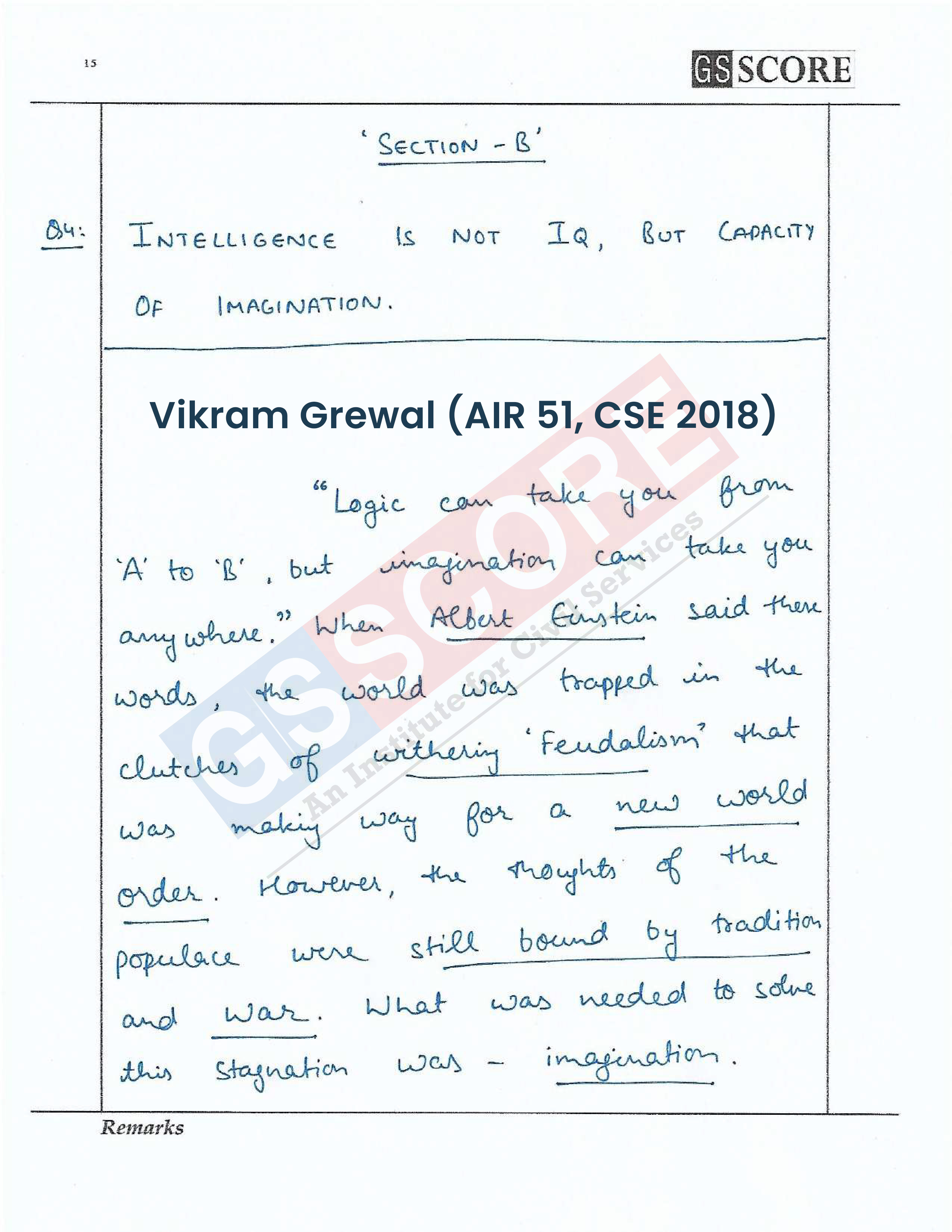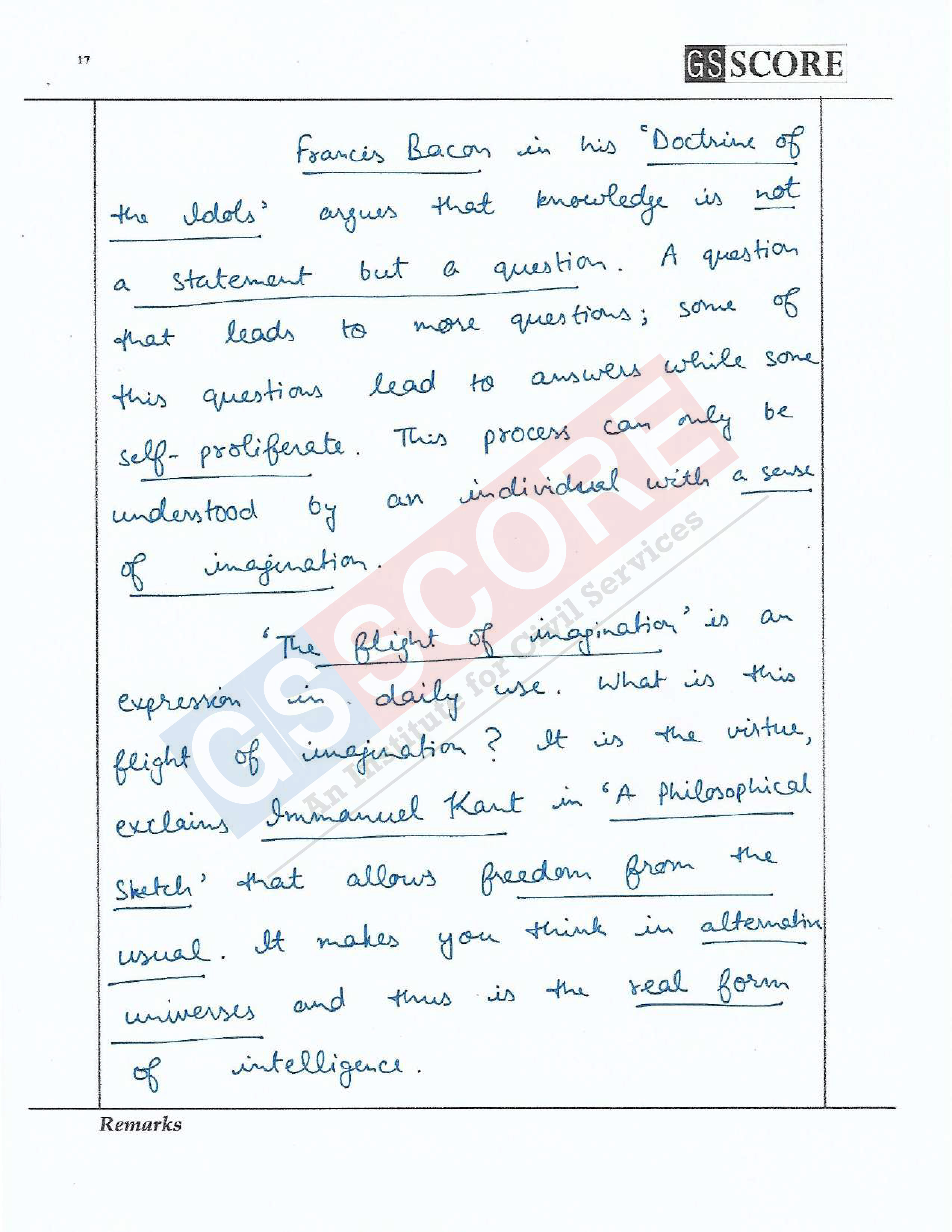“It is my ambition to say in ten sentences what others say in a whole book.” -- Friedrich Neitzsche
Essay writing is among those areas in UPSC IAS Exam that can be your savior and improve your marks significantly if worked efficiently. However lack of practice and rudimentary approach may also reduce your marks and jeopardize your chances of selection in Civil services exam. A well-developed approach and rigorous practice can significantly enhance your score in essay paper in UPSC mains Exam. But before delving into the techniques to write a perfect essay it is very important to understand what is an essay and what are its different organs?
What is an essay?
- An Essay Writing is a focused, descriptive and analytical write up on any particular topic. But this is different in format and presentation from any other kind of write up on the same topic.
- An essay is a tight write up which has a certain theme at its core and the write up is marked by its simplicity, lucidity, flow and orderliness.
- It should generally avoid terse and unwieldy expressions, unnecessary exposition and excessive facts, especially numbers.
- An essay is a write up that evolves from childhood to youth and thereafter to maturity.
- An essay should generally reflect the perceptions, understanding, and stance/take of the writer, which may be supported by facts, quotes and findings of similar kinds.
Let's have a look on Vikram Grewal's Copy

For full copy click here
What an essay writing should not be...
- It should not be a mere compilation of information or facts.
- It should not be a long note.
- It should not be a brief note.
- It should not be a theoretical exposition.
- It should not be a conglomeration of great ideas by great people.
What constitutes a good essay?
A good essay should have three distinct parts-
- Introduction
- Description
- Conclusion
A good essay should be close to its subject or theme throughout the write up.
Essay Writing Strategy by Vikram Grewal (AIR 51, CSE 2018), A must watch session for more clarity.
A good essay should reflect...
- Understanding of the writer
- Thoroughness of the writer
- Analytical capacity of the writer
- Research and analytical capability of the writer
- Reading habits of the writer
For Example:
Vikram Grewal's Copy, all the following things are considered by him:

Click Here for Full Copy
Essay needs a higher level of communication abilities viz.
- Articulation
- Effective expression
- Logic, flow and rhythm
- Right grammar
- Style
Brief for practicing essay writing – pre exam hall approach.
How to write a good Essay can be viewed sequentially, as if going through ten sequential steps in an essay writing process.
- Research: Begin the essay writing process by researching your topic, making yourself an expert.Assuming you've been given a topic, or have narrowed it sufficiently down, your first task is to research this topic. You will not be able to write intelligently about a topic you know nothing about. To discover worthwhile insights, you'll have to do some patient reading and information gathering. Though IAS aspirants are hard pressed of time but don’t forget it is of 250 marks and highly neglected. It can be done through integration of your daily newspaper reading and through preparation of GS also. But you need some different strategy to do so.
- Analysis: Now that you have a good knowledge base, start analyzing the arguments of the essays/articles you're reading. Clearly define the claims, write out the reasons, the evidence, etc. Look for weaknesses of logic, and also strengths. Learning how to write an essay begins by learning how to analyze essays written by others.
In case of analysis Vikram Grewal shows it perfectly: Here is a look

For Full Copy Click Here
3.Brainstorming: Your essay will require insight of your own. Ask yourself a dozen questions and answer them. Meditate with a pen in your hand. Think and think until you come up with original insights to write about.
- Thesis: Pick your best idea and pin it down in a clear assertion that you can write your entire essay around. Your thesis is your main point, summed up in a concise sentence that lets the reader know where you're going, and why. It's practically impossible to write a good essay without a clear thesis.
- Outline: Sketch out your essay before straight away writing it out. Use one-line sentences to describe paragraphs, and bullet points to describe what each paragraph will contain. Play with the essay's order. Map out the structure of your argument, and make sure each paragraph is unified.
- Introduction: Now sit down and write the essay. The introduction should grab the reader's attention, set up the issue, and lead in to your thesis. Your intro is merely a buildup of the issue, a stage of bringing your reader into the essay's argument.(Note: The title and first paragraph are probably the most important elements in your essay. This is an essay-writing point that doesn't always sink in within the context of the classroom. In the first paragraph you either hook the reader's interest or lose it.)
- Paragraphs: Each individual paragraph should be focused on a single idea that supports your thesis. Begin paragraphs with topic sentences, support assertions with evidence, and expound your ideas in the clearest, most sensible way you can. Speak to your reader as if he or she were sitting in front of you. In other words, instead of writing the essay, try talking the essay.
- Conclusion: Gracefully exit your essay by making a quick wrap-up sentence, and then end on some memorable thought, perhaps a quotation, or an interesting twist of logic, or some call to action. Is there something you want the reader to walk away and do? Let him or her know exactly that.
- Style: Format your essay according to the correct guidelines for citation. All borrowed ideas and quotations should be correctly cited in the body of your text, followed up with a Works Cited (references) page listing the details of your sources.
- Language: You're not done writing your essay until you've polished your language by correcting the grammar, making sentences flow, incorporating rhythm, emphasis, adjusting the formality, giving it a level-headed tone, and making other intuitive edits. Proof read until it reads just how you want it to sound. Writing an essay can be tedious, but you don't want to bungle the hours of conceptual work you've put into writing your essay by leaving a few slippy misspellings and poorly worded phrases.
Steps to be followed during examination:
We must keep in mind that an essay writting in the examination hall is developed on the spot within a given time period, is something different from an essay written leisurely and with mature deliberation for a publication or for a prize competition.
A Candidate writing an essay for Civil Service Examination should keep in mind that he has to satisfy the examiner with regard to 3 things:
- He has good ideas on given subject / chosen field.
- He can arrange his ideas systematically.
- He can express, and analyze his opinion correctly using good language.
Required Steps to create a rough sketch before actual writing :
- Selection of suitable topic
- Make an outline of your ideas
- Write introduction points
- Write main points of the body
- Brief sketch about view, history, facts, illustrations, examples etc
- Idea about critical discussions, pro and opposite views
- Drawing a conclusion that clearly expresses your opinion and always end with a futuristic note
Selection of topic is the key for scoring in essay writing. Around 15 to 20 minutes can be spent on choosing best topic. we also needs to be sure about the flow of thought, rich facts and figures, history, analytical expression and all to be collectively rated high in the selected topic. It impacts your marks. Out of six topics consider each one independently in-depth your knowledge and presentation skills not in bird-eye-view manner.
Patience and perseverance must be maintained while selecting a topic and make it sure about excellence to present cogently.
Next step is outlining the selected topic by putting ideas in a separate page, in organized form by writing sub topics and important points to be covered in the essay. For this one can make use flow chart model or line chart or tabulation. Grouping of thoughts must in a way to categories the sub headings while writing the detailed essay. We can use 15 to 20 minutes for this task.
Then start with the introduction which can be a dialogue, quotation or anecdotes produces complete idea to the reader about the essay. A dialogue could be simply the pertinent fact that explicitly illustrates the point you are planning to make. An anecdote is stories that illustrate the point. Be sure your anecdote is short, precise and relevant to the topic.
Three problems that candidates face while writing an essay. They are:
- Ideas
- Coherent arrangement
- Expression Ideas
Essay Copy: Vikram Grewal(AIR 51, CSE 2018)

About the subject is nothing but knowledge that needs to be looked in different perspective, whether social, economical, political, religious, cultural, literary, national, and environmental. Candidate should think on different questions
- What are definition / scope / history of the topic?
- What can be said on particular subject from various perspectives?
- What are positives / negatives?
- Answers for different questions/dimensions
- your thought for critical appraisal
Arrangement :
Arrangement of an essay means the contents with a definite structure to be framed. The structure must be exposed indirectly through the flow of writing with interlinking of sub topics and paragraphs explaining the scope meaning, description and discussion.
Illustration and quotations known can be presented lively aptly to increase the richness of the content. It is like the flavor added to the dishes to attract the reader to be perfectly relevant to the topic/ argument. If the Quotations exceed unnecessarily, it will disturb the quality of presentation. Interlinking of thoughts, comparison and contrasting viewpoints can be expressed only with the special reference to the application of thoughts.
Opinions and arguments with strong self explanatory sentences will reflect the candidates’ solid and clear understanding of the subjects.
Now you need to give the powerful and logical conclusion which is the consequence of everything discussed earlier. Conclusion brings the reader closure or summing up of points and also gives final perspective. It should not be rhetoric outburst. It must be balanced and free from prejudice. Mind it, give proper space to the conclusion. Don’t sump in haste.
Do s and Don’ts for that ‘killer’ 3 Hrs:
- Read the title, understand the meaning and scope.
- Think and comprehensive planning before start.
- Effective, brief and strong words consist of good thoughts makes your essay best.
- Avoid vague generalization, slang’s and colloquialism
- Don’t try to present whatever you know on the subject.
- In controversial topic discuss pros and cons dispassionately and give effective conclusion.
- Length of essay is not fixed. But don’t be exhaustive. This time you may to write multiple essay
- Never forget to read and revise the essay written before submission to examiner.
***
Related Articles


